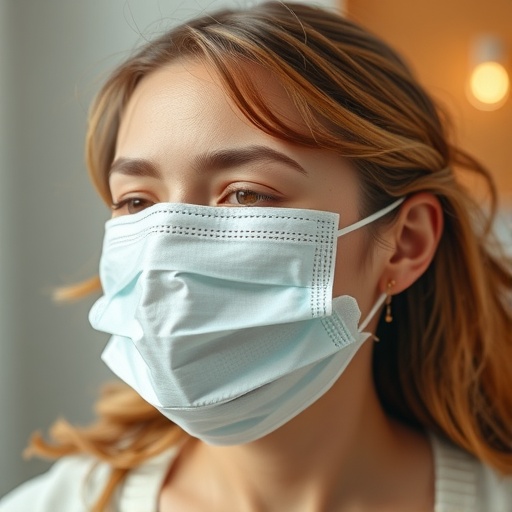Amid an escalating environmental crisis marred by oil spills that threaten marine ecosystems worldwide, a groundbreaking study led by F. Topuz presents a novel approach to mitigating this issue by utilizing discarded medical facemasks. This innovative research, published in “Environmental Science and Pollution Research,” explores the transformative potential of upcycling medical facemasks into macroporous sorbents specifically designed for marine oil spill cleanup operations. With the globe grappling to reduce waste while confronting environmental degradation, this study holds not only ecological promise but also sparks a dialogue around sustainable practices in waste management and disaster response.
The world is at a tipping point concerning waste generation, particularly stemming from the COVID-19 pandemic, where millions of disposable masks have flooded landfills and oceans. The sheer volume of medical facemasks discarded poses an enormous environmental challenge. With plastic pollution already wreaking havoc on marine life, the idea of repurposing these masks into effective and functional materials offers a glimmer of hope. Topuz’s research taps into this pressing need by proposing a method that not only addresses waste but also harnesses it for environmental good.
Topuz’s research delves deeply into the properties of medical facemasks, highlighting their fiber composition and structural characteristics. Often made from polypropylene, these facemasks showcase a unique filaments arrangement that lends itself well to the creation of macroporous structures suitable for sorbent purposes. By transforming these materials, the research presents a twofold solution: reducing the volume of plastic waste while developing an efficient method for oil spill remediation. Such an endeavor is pivotal in the face of increasing oil spill occurrences which have devastating impacts on marine fauna and ecosystems.
The methodology employed in the transformation of medical facemasks into sorbents is meticulously detailed. The process begins with the collection and sterilization of used facemasks, ensuring that any biohazardous risks are adequately mitigated. Once sanitized, these masks undergo a mechanical disintegration process that breaks them down into fibers. This mechanization not only enhances the surface area of the material but also aids in developing the desired porosity. The morphologies achieved through this process are vital in maximizing oil absorption during spills.
Furthermore, the upcycled product is engineered into distinct sorbent pads, finely tuned for optimal absorption capabilities. Experiments conducted by Topuz indicate impressive oil absorption rates, demonstrating the effectiveness of these sorbents in real-world applications. In tests simulating oil spill conditions, the macroporous sorbents displayed a remarkable affinity for oil, outperforming many conventional sorbent materials currently in use. This is not merely a case of theoretical efficiency; the practical implications of deploying such sorbents during marine incidents could revolutionize cleanup operations.
The environmental implications of this study are profound. Using waste materials for critical environmental protection tasks promotes a circular economy, wherein products are not merely discarded but actually reincarnated into valuable resources. This shift in perspective is essential in a world that continues to lean heavily on single-use plastics. Moreover, successful implementation of this sorbent in oil spill scenarios could reduce the reliance on synthetic sorbents, which often carry their own environmental burdens.
Topuz’s work on upcycling medical facemasks also opens a pathway to deeper discussions on policy and regulations surrounding medical waste management. As these materials undergo their second life cycle, there emerges a need for strategic collaboration among policymakers, environmental groups, and the medical community. Such partnerships are vital to ensure the infrastructure for collection and recycling of medical waste is in place, thereby preventing further environmental degradation.
Challenges remain, however, in the widespread adoption of the technologies detailed in Topuz’s research. Key among these is public perception and acceptance of using upcycled materials in mechanical applications. As people become increasingly eco-conscious, educating the community about the benefits and safety of such innovations will be crucial to their acceptance and implementation. Pilot programs and community engagement initiatives may prove essential in overcoming these hurdles.
In conclusion, the ingenuity of repurposing medical facemasks into sorbent materials for marine oil spill remediation highlights the potential of innovative recycling techniques in combating environmental issues. Topuz’s research not only presents a feasible framework for reducing waste but also champions a movement towards sustainability within the medical and environmental sectors. As the world continues to adapt to the realities of waste and pollution, pioneering concepts like these could pave the way for radical changes in how society handles plastic waste.
This study stands as a clarion call for further research into upcycling within the medical field, with implications extending beyond just facemasks. By pushing the boundaries of material science, it invites researchers and industries alike to examine other avenues where waste can be repurposed effectively. The need for comprehensive solutions to environmental challenges is more pronounced than ever, and strategies that involve collaboration, innovation, and sustainability will be pivotal in shaping a more resilient future.
Embracing the spirit of innovation exemplified in Topuz’s research may inspire a broader shift in how various industries approach sustainability. It emphasizes the critical need to rethink conventional practices and consider the lifecycle of materials from the outset. The continued pursuit of groundbreaking solutions and the willingness to explore unconventional pathways hold the key to protecting our planet for future generations.
As the scientific community continues to explore avenues for tackling environmental issues, it will be essential to keep pushing forward, testing boundaries, and harnessing creativity to build a more sustainable world. This research by Topuz may very well serve as a catalyst for a renewed commitment towards environmental stewardship and innovative problem-solving.
Subject of Research: Upcycling medical facemasks for environmental remediation
Article Title: Upcycling medical facemasks into macroporous sorbents for marine oil spill cleanup
Article References:
Topuz, F. Upcycling medical facemasks into macroporous sorbents for marine oil spill cleanup.
Environ Sci Pollut Res (2025). https://doi.org/10.1007/s11356-025-37160-2
Image Credits: AI Generated
DOI: https://doi.org/10.1007/s11356-025-37160-2
Keywords: Upcycling, medical facemasks, oil spills, environmental science, pollution, macroporous sorbents




